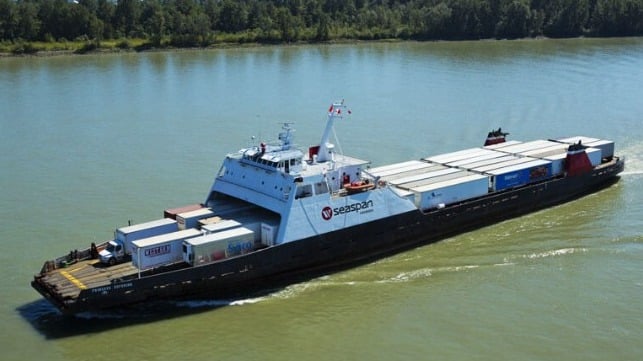Seaspan Starts Canada’s First Marine Test of Renewable Natural Gas

Canadian ferry operator Seaspan Ferries has become the first Canadian marine company to pilot the use of Renewable Natural Gas (RNG) to reduce greenhouse gas emissions from its ferry operations. Seaspan expects that data from the pilot will confirm that, by using RNG, greenhouse gas emissions can be reduced by upwards of 85 percent versus traditional diesel fuel for its fleet of Ro-Ro liquefied natural gas (LNG) powered vessels.
The gas used in the test is being supplied by FortisBC Energy made from organic waste. When bacteria break down organic waste from sources such as landfill sites, agricultural waste, and wastewater from treatment facilities, it produces a biogas mostly made of methane. FortisBC captures and purifies this biogas to create RNG, a certified carbon-neutral energy source, that also has the benefit of preventing the release of methane that would otherwise be released into the environment.
“Renewable Natural Gas, when used in our fleet in conjunction with traditional natural gas, will allow us to move towards our emissions reduction goals and make a real impact on our carbon footprint,” said Harly Penner, director of fleet engineering and vessel development at Seaspan. “It also allows us to leverage the growing production of RNG in our region. We look forward to continuing to work on growing our sustainability efforts in the near future.”
FortisBC has been working to scale up the production of RNG. They re-opened their RNG program to new subscribers on October 15 after dramatically increasing supply over the last year. By the end of 2021, FortisBC expects it will have tripled its RNG supply from 2020 and is poised to potentially triple it again by the end of 2022, if expected projects proceed on pace.

that matters most
Get the latest maritime news delivered to your inbox daily.
“We know that our future is a renewable one – so when Seaspan approached us about being a part of an RNG pilot for marine LNG vessels, we were tremendously excited,” said Mike Leclair, vice-president, major projects and LNG at FortisBC. “Using Renewable Natural Gas for marine LNG has the potential to be an emissions game changer for the sector and is yet another example of how renewable gas development is transforming our natural gas infrastructure into a delivery system for carbon-neutral energy, supporting B.C’s climate action goals.”
RNG mixes seamlessly into the existing natural gas infrastructure, making it possible to displace equivalent volumes of conventional natural gas and lowering greenhouse gas emissions overall. Like conventional natural gas, RNG can be used as a transportation fuel in the form of compressed natural gas or LNG. Renewable Natural Gas has been approved by BC’s Ministry of Energy, Mines and Low Carbon Innovation for inclusion within the province’s Low Carbon Fuel Standard for transportation.
